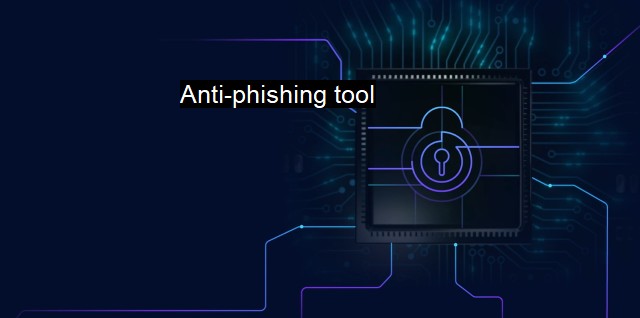What is Anti-phishing tool?
Combatting Cyber Threats: The Importance of Anti-Phishing Tools in Our Digital World
An "anti-phishing tool" refers to a computer software program formulated to identify and protect against phishing threats while surfing the online realm. Phishing is a form of cybercrime where a target (or targets) is contacted by email, telephone or text message by someone posing as a legitimate institution to lure individuals into providing sensitive data such as personally identifiable information, banking and other financial details, and passwords. The information is then used to access important accounts, enabling identity theft and financial loss.Situated within the broader context of cybersecurity and antivirus programs, the role of an anti-phishing tool is similar to that of an automated watchguard, identifying potential threats and neutralizing them before harm can transpire. Given the increasing sophistication of phishing techniques, including the rise of spear-phishing, where targets are selected with precision for maximum impact, the importance of having robust anti-phishing tools cannot be overstated.
These tools usually function through powerful algorithms and large databases of known phishing websites, emails, IP addresses, and other threat identifiers. An anti-phishing tool continuously scans your system for such threats, and once detected, either blocks or sends warnings to users regarding the malicious attempts to access personal information. It is imperative to note that the effectiveness of anti-phishing significantly depends upon its ability to identify new or unknown phishing attacks, dubbed zero-day phishing attacks.
In the grand scheme of antivirus software, anti-phishing tools generally form an integral part of the package. Larger security suites will include a variety of defense mechanisms against different types of cybersecurity threats, phishing among them. Similarly to how the antivirus tool scans for malicious software posing a security risk, the anti-phishing tool will be dedicated towards looking for signs of phishing attempts. Anti-phishing tools, thus, work in tandem with other secure enclave aspects to provide a more holistic approach to cybersecurity.
That said, the existence of an anti-phishing tool within one's antivirus software doesn't make remaining vigilant unnecessary. Despite advancements in computing security, scammers are developing increasingly clever methods to trick potential victims. The common phishing methods such as fraudulent emails, messages disguised as coming from reputable sources, and alarming notifications designed to evoke a sense of urgency are becoming increasingly convincing.
Yet, it should be emphasized, there is an increased understanding of online security within the general populace, and tools such as anti-phishing software are gaining wider adoption. Thanks to improvements in technology and data-handling algorithms, these tools constantly evolve to be one step ahead of new phishing techniques.
For the most part, contemporary anti-phishing tools provide an essential deterrent against phishing. Utilizing machine learning algorithms, regularly updated databases, and predictive analytics, they offer proactive defenses against not just known but emergent threats as well. They weed out most phishing emails flagging them as spam, block access to aforementioned malicious sites, and scrutinize downloads and links for potential threats.
Therefore, an anti-phishing tool, with its comprehensive protective strategy against cybercriminal exploits, forms the first line of defense in securing your identity and financial information online. It certainly is an essential piece of your online security toolkit, recommended for anyone utilizing the internet, be it personal use or otherwise. Precisely because today, the greatest risk when engaging with digital technology isn't a broken device, but rather, compromised security and the encompassing implications that can entail.
To sum up, the anti-phishing tool isn't just a fringe component of cybersecurity, mutely embedded within antivirus software. It is rather an active, dynamic guardian, ever vigilant against the clever guises of cybercriminals that may cause significant harm both financially and more broadly to your digital identity.

Anti-phishing tool FAQs
What is an anti-phishing tool?
An anti-phishing tool is a cybersecurity solution that helps protect users from phishing attacks. The tool identifies potential phishing emails or websites and blocks them or alerts the user to the potential threat.How does an anti-phishing tool work?
An anti-phishing tool works by using various methods to detect and prevent phishing attacks. These can include analyzing email content and links, monitoring website activity for suspicious behavior, and using machine learning algorithms to identify and block known phishing attempts.Why is an anti-phishing tool important for cybersecurity?
Phishing attacks are a common and dangerous cybersecurity threat, as they can trick users into giving away sensitive information or downloading malware. An anti-phishing tool helps improve overall cybersecurity by preventing these types of attacks and minimizing the risk of data breaches or other security incidents.What should I look for in an anti-phishing tool?
When selecting an anti-phishing tool, look for one that offers real-time detection and protection, as well as customizable settings and reporting capabilities. It is also important to choose a reputable provider with a track record of effective cybersecurity solutions and responsive customer support.| | A | | | B | | | C | | | D | | | E | | | F | | | G | | | H | | | I | | | J | | | K | | | L | | | M | |
| | N | | | O | | | P | | | Q | | | R | | | S | | | T | | | U | | | V | | | W | | | X | | | Y | | | Z | |
| | 1 | | | 2 | | | 3 | | | 4 | | | 7 | | | 8 | | |||||||